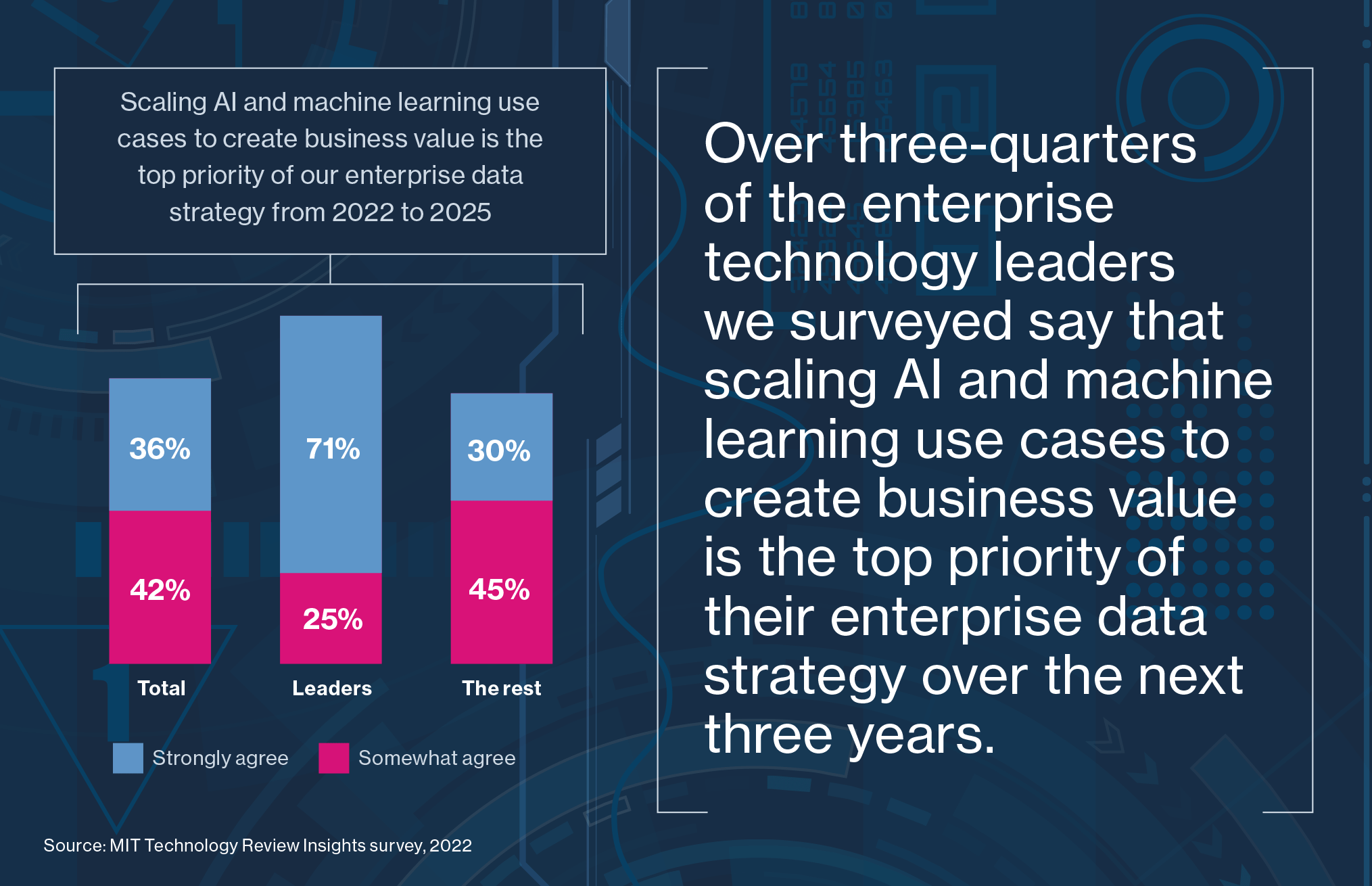Nearly a decade after they emerged from science labs, AI and machine learning are firmly embedded in enterprise technology environments and are starting to generate value for many businesses. It is increasingly difficult to find organizations that have not at least explored AI use in their business in some way. In a survey, conducted by MIT Technology Review Insights, of 600 CIOs and other technology leaders, the share of those saying their companies are not using AI today is 6% or less in any of seven core enterprise functions.

Although the hype surrounding AI and machine learning has largely subsided and use case development is widespread, these technology fields—and especially their commercial application—are still early in their maturity. Just a small number of organizations in our research aim to become AI-driven—a status we define as AI and machine learning underpinning almost everything the enterprise does—by 2025. However, this elite group—who we term “AI leaders” and comprise 14% of the overall survey sample—as well as the many others looking simply to embed AI more firmly in the enterprise foundations face formidable challenges to achieving their objectives.
Addressing shortcomings in companies’ data management and infrastructure, as well as internal structural and process rigidities and talent deficits, loom large among those challenges. Some 72% of the technology executives we surveyed for this study say that, should their companies fail to achieve their AI goals, data issues are more likely than not to be the reason. Improving processing speeds, governance, and quality of data, as well as its sufficiency for models, are the main data imperatives to ensure AI can be scaled, say the survey respondents.

This report sheds light on these and other data constraints that organizations must address to unleash the potential AI holds for their businesses. It also identifies the investments and other measures companies plan to take to align their data capabilities more closely with their AI ambitions. The study’s findings are based on a global survey of 600 chief information officers, chief technology officers, and other senior technology leaders. We also drew insights from in-depth discussions with 10 such executives.
Following are the study’s key findings:
- Companies view wider AI adoption as mission-critical for their future. From mostly limited AI use across the enterprise today, the surveyed executives plan a major expansion of use cases in all core functions in the next three years. Well over half expect AI use to be widespread or critical in their IT, finance, product development, marketing, sales, and other functions by 2025. While most will pursue a wide variety of use cases, many also aim to boost AI’s impact on the top line, increasing the returns from revenue-generating uses.
- Scaling AI successfully is priority one for the data strategy. The surveyed companies’ data and AI strategies are closely interlinked. Over three-quarters (78%) of the executives we surveyed—and almost all (96%) of the leader group—say that scaling AI and machine learning use cases to create business value is their top priority for enterprise data strategy over the next three years.

- Major spending growth is planned to bolster AI’s data foundations. The surveyed CIOs—especially those in the leader group—plan sizeable increases in investment between now and 2025 to strengthen different parts of their data and AI foundations. Leader spending on data security over the next three years will rise by 101%, on data governance by 85%, on new data and AI platforms by 69%, and on existing platforms by 63%. (The analogous figures among the sample as a whole are 59%, 52%, 40%, and 42%, respectively.)
- Investment growth intentions are strongest in the financial services industry. Among the fourteen industries in the survey, AI leaders are most numerous among retail/consumer goods and automotive/manufacturing companies. Expected investment growth in these sectors in the above areas of data management and infrastructure is higher than in others with one exception: planned increases by financial service providers will substantially exceed those in all other sectors.
- Multi-cloud and open standards are integral to AI progress. Most of the survey respondents (72%)—and almost all leaders (92%)—appreciate the flexibility that a multi-cloud approach provides for AI development. CIOs interviewed for the study also emphasize the role of open architecture standards in supporting multi-cloud, and the importance of both in progressing their AI development.
This content was produced by Insights, the custom content arm of MIT Technology Review. It was not written by MIT Technology Review’s editorial staff.
